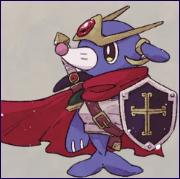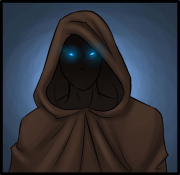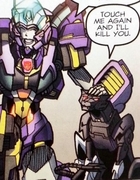|
PST posted:'Felixgamingx1' thinks this is a good free product to promote his company/game. And if you (general you, not PST specifically) want to read about New Horizon itself, head on over to the FATAL & Friends thread. I've been considering doing a blitz through all of the free supplements once the main book is done. Flail Snail fucked around with this message at 14:38 on Oct 11, 2019 |
|
|
|

|
| # ? May 25, 2024 05:08 |
|
Flail Snail posted:And if you want to read about New Horizon itself, head on over to the FATAL & Friends thread. I've been considering doing a blitz through all of the free supplements once the main book is done. Thanks, time to put on some popcorn and get reading.
|
|
|
|
Before you go read New Horizons F&F (which is where I'm headed right now), read this: https://kotaku.com/dungeons-deceptions-the-first-d-d-players-push-back-1837516834
|
|
|
|
Dawgstar posted:Even I, noted dumb-dumb, found the basic 4E classes pretty intuitive to make a character with. Nothing felt like you had to be a super-specced Half-Orc spiked chain Fighter or whatever. Appropos of nothing, this was the exact second character I ever played in 4e.
|
|
|
|
I'm gonna put on my software technical writer hat and lecture a little bit about the word "complexity" because it has come up and I think there's some semantic disagreements here, and semantics are vital to every discussion. I apologize for the very long post, there's a tl;dr at the end if you prefer. I document complex systems. My goal is to provide a body of work that allows customers to do three things:
For each of these goals, it is necessary to confront and deal with the complexity of the system. The complexity is simultaneously an obstacle and an opportunity:
So, right off the bat, it should be obvious that complexity is not inherently good or bad. Unnecessary complexity may be "bad," when it is not in service to utility or specialty; essentially, a complicated product ought to either provide lots of tools, or be much more suitable and effective for a narrow and specific purpose than a more generalized product. Examples might be: the Java programming language is complex because it provides a huge range of capabilities; a software application specifically made for small health care clinics is complex because it's got modules and features to handle all the myriad issues specific to small-scale health care, like combining patient records legal compliance management, insurance company billing, and small business administration functionality. You could consider "complexity" here to be a shorthand for meaningful/useful choices, functions, options. On the other hand, a problem systemic to the software industry is the tendency to add more and more features to a product, each of which may satisfy the demands of one or two customers but most of which are irrelevant to most customers. This is the trap of the generalist application that is trying to be a platform (like Java) where it ought instead to be a many different more-focused applications (one for optician offices, one for veterinarians, one for methadone clinics, and one for pharmacies, for example). Here, "complexity" means lots of choices that are mostly not relevant, meaningful, or useful. Especially bad is when the user is forced to make irrelevant choices, rather than being able to at least bypass or ignore them when they're not applicable. My free clinic doesn't bill customers, but the software setup forces me through a billing setup wizard, and now I have to look up what to put into these fields or find if there's a way to disable this module? I might say "wow this poo poo is too complex, I want something simpler!" My job typically involves a point in the software development lifecycle where other people have already produced the software, with varying aspects of the above types of good and bad complexity already built in. My job is to communicate effectively regardless, and use documentation to help customers navigate and make use of what they need. Ideally when someone performs a Google search, or comes into my company's doc portal and does a search, or a filter based on keywords (product, technology, lifecycle, etc.), they arrive due to effective orientation (titles, short descriptions, etc.) at a document that is going to immediately address their specific need. Usually one of the three items I listed at the top. Effective documentation from that point can give the user exactly what they need regardless of complexity. Often the more complex the software, the more topics I need, and the more work I need to do to organize it, but each topic itself does not have to be especially long or especially complicated. Complexity can always be broken down. The user can be offered up what they need in small chunks. Often they don't need the whole thing (don't force the user to learn how to set up billing, or to scroll past all that info... they might not need that). Often the user has a particular task they are trying to accomplish (how do I add a second administrator-user? How do I print a replacement bill for a customer that was electronically-billed last year? How do I integrate this software package with my vendors' automated supply ordering system?) or a particular requirement they're trying to look up (what's the minimum and maximum password length?). Ideally they'd locate a small procedure that does not cross-reference lots of other stuff, so they can just follow some steps and complete their task; or, they'll find a reference page with a list of requirements, go down a table till they see the password restrictions, and find the ones they want. Conversely, the bad old approach to software documentation is to print a manual, and expect customers to read it cover to cover, because the only mode of interaction anticipated was someone going from system-ignorant to system-master. A user of even a relatively simple software application, confronted with a large block of content detailing every aspect of that system, might well decry it as "too complex." In fact, it is not the system which is too complex, but rather, the documentation which is not sufficiently granular, not organized according to information type (does not separate or at least categorize clearly by reference, concept, and task), etc. So when someone talking about RPGs mentions complexity, I immediately tend to wonder. Do they mean:
My experience with RPGs is admittedly limited. But I have played games with both a lot and hardly any complexity in several different ways. PDQ is a powerful and flexible platform, but it is not complex at the technical level. Old-school RIFTS presents unnecessary complexity in the weapons lists, providing a dizzying array of options all of which amount to very little actual difference in the game (but at least it's all shoved in a reference section, so you aren't forced to read through the gun lists if you're not trying to pick a gun.) The modern Battletech system layers multiple systems, from fighting four mechs against four mechs on the tabletop, to a modified level of play for multiple squadrons of mechs, to systems that support warfare on a planetary scale... but each system is documented separately, so as a player you need only engage with the document that is relevant to the level of play you're engaging with, reducing the complexity you're confronted with at any particular level. There's good and bad complexity all over the place in games. And of course, D&D, in every edition. Complexity in D&D arises from several layered mechanisms (ability scores, skills, feats, levels, saves, magic, combat, mapping, characterization, refereeing, encounter creation, etc.) and from the specific complexity of any given mechanism (how many feats are there and how do they collectively interact); and, separately, from the documentation (just the PHB? all the supplements too? HOW many splatbooks are there? Where are the treasure tables by monster type, would it really have been so hard to just list the treasure alongside the monster? Why do all NPCs in this edition have all the stats and abilities etc. of a full PC, when the players will encounter, attack, and kill him in three rounds of combat?) Document organization can either relieve or add to perceived complexity. The complexity of the game system can be compounded by documentation that does not permit good navigation. A player who asks, "Where can I see a list of just the feats my halfling cleric can take?" may decry the game as "too complex" if the answer is "here is my shelf of books, every one of them has some feats, you need to read through all of them" but instead say "oh this isn't so complex" if their character builder tool helpfully filters an electronic reference DB of feats so that only those allowed by class, race, level, etc. are shown. Combat for a player playing a human fighter might seem "simple" if their only real options are Basic Attack and Power Attack; but they might also seem "simple" even if their 4E Paragon fighter has a dozen powers usable in combat, provided those powers are printed out on index cards with color-coded headers and all their modifiers pre-calculated. Information design can move some underlying complexity off the user's immediate mental map, easily referenced when needed but unnecessary to engage with constantly just in order to function. tl;dr, I'm not weighing in on the debate over whether "good game design" can or should include "simple" options/playstyles alongside "complex" ones. But I do think it is useful to identify and categorize types of complexity, what they serve or do, and recognize that in many cases documentation can enhance the utility of complexity or conversely, create a complexity-obstacle. When someone says "this game/class/system is complex" it would be helpful to understand that complexity is not inherently a flaw nor an advantage, and that documentation can usually mitigate some of the challenges that complex systems present to players.
|
|
|
|
is there even an example of a "simple Fighter vs complex Wizard" dichotomy existing outside of D&D?
|
|
|
|
The job I retired from was as a technical writer of extremely complex documentation for custom database interfaces. The things that were most important to those were: Clarity of language. (As little jargon as possible) A steady and controlled flow of ideas from basic concepts with examples and reasons why these examples work, and only then moving up to more advanced principles Logical grouping of sections. A good index If you only follow those four things, your game becomes immediately more understandable.
|
|
|
gradenko_2000 posted:is there even an example of a "simple Fighter vs complex Wizard" dichotomy existing outside of D&D? Shadowrun has similar issues, although they're downplayed by the numerous other much larger problems, including other much larger narrative imbalances, the huge gap in spotlight time that certain characters get, and by the fact that every shadowrun game ever run ever immediately becomes a farce when the adventure starts.
|
|
|
|
|
gradenko_2000 posted:is there even an example of a "simple Fighter vs complex Wizard" dichotomy existing outside of D&D? Video games. In Final Fantasy youíll have characters who can hit things and characters who have to choose the best spell for the situation, but thatís mitigated by a. Being single player so the player is still engaging with both levels of complexity and b. Having mp be a more relevant mechanic than spell slots because dungeons arenít afraid of putting you through enough combats to meaningfully drain your resources (largely because they go much faster)
|
|
|
|
thetoughestbean posted:Video games. In Final Fantasy youíll have characters who can hit things and characters who have to choose the best spell for the situation, but thatís mitigated by a. Being single player so the player is still engaging with both levels of complexity and b. Having mp be a more relevant mechanic than spell slots because dungeons arenít afraid of putting you through enough combats to meaningfully drain your resources (largely because they go much faster) Also spells are almost always purely means of just ending fights. The fighter/wizard issue would be a lot less pronounced if it was simply Basic Attack Fighter vs. Fireball Wizard which is much closer to a lot of JRPG situations. No final fantasy game is letting you use Blind to sneak past the dungeon mini-boss or to impress the queen with the wide array of blue magic spells you've learned.
|
|
|
|
Wow... Dungeons and dragons is JavaScript...
|
|
|
|
Humbug Scoolbus posted:The job I retired from was as a technical writer of extremely complex documentation for custom database interfaces. I kinda miss indexing. It was sorta a zenlike thing to do to a big doc at the end of your hard work. Nowadays we don't bother: nobody uses them, all docs are online and everyone uses search. Your second bullet makes me think you did a lot of tutorials. We are moving hard away from those, too, because everything is chunked content that can be re-used in multiple documents; you can't take Step 4: Now We Add Another Twist out of a tutorial, slap it halfway through a separate process doc on How To Do The Twist, and have it make sense. Content re-use standards are actually forcing a lot of otherwise kinda lazy/sloppy grognard writers to clean poo poo up though, so I love it. Clarity of language is huge, especially when you're writing for translation (the stuff I do right now gets machine translated into 10 languages). In school they taught us that all technical documentation must hit the "four Cs": Clear, Complete, Correct, Concise. Those are fundamentals; if you can't consistently hit all four, your docs are doomed no matter what other cool poo poo you're doing.
|
|
|
|
Humbug Scoolbus posted:Clarity of language. (As little jargon as possible) The caveat here is that "as little jargon as possible" in a game (or documentation intended for experts in a narrow field) is not the same "as little jargon as possible" in documentation intended for use by the average person.
|
|
|
|
thetoughestbean posted:Video games. In Final Fantasy youíll have characters who can hit things and characters who have to choose the best spell for the situation, but thatís mitigated by a. Being single player so the player is still engaging with both levels of complexity and b. Having mp be a more relevant mechanic than spell slots because dungeons arenít afraid of putting you through enough combats to meaningfully drain your resources (largely because they go much faster) This also largely isn't as much a thing as it used to be. Early Final Fantasies had it because early Final Fantasies were Wizardry fangames and Wizardry was a D&D fangame. jRPGs in general - and to be frank most non-D&D based western RPGs as well - have moved away from the idea of having a mixture of *super* complex characters and dead simple characters. Most simply have all characters at the same general "medium" level of complexity and then maybe add one or two characters that aim in different directions; largely though, everyone is some kind of "can fight, can also use powers" sort, where mana is used for both fire attacks (make sure you know enemy weaknesses first, is the added complexity here) and for an attack where you hit a fucker extra hard, and also their defense goes down.
|
|
|
ProfessorCirno posted:This also largely isn't as much a thing as it used to be. Early Final Fantasies had it because early Final Fantasies were Wizardry fangames and Wizardry was a D&D fangame. jRPGs in general - and to be frank most non-D&D based western RPGs as well - have moved away from the idea of having a mixture of *super* complex characters and dead simple characters. Most simply have all characters at the same general "medium" level of complexity and then maybe add one or two characters that aim in different directions; largely though, everyone is some kind of "can fight, can also use powers" sort, where mana is used for both fire attacks (make sure you know enemy weaknesses first, is the added complexity here) and for an attack where you hit a fucker extra hard, and also their defense goes down. (or, well, did, until the latest expansion just ditched TP entirely since it wasn't actually limiting much unless you died and got rezzed and thus had your bar emptied.)
|
|
|
|
|
Later Period Dragon Quest also for a while differentiated between "Magic" and "Skills", with Skills being a catchall for everything from "I sing a lullaby" to "I call my flock of sheep to run you over" to "I annihilate you in an eruption of demonic hellfire". Notably upper tier Skills often cost MP, while lower tier ones often didn't. Also notably most games didn't lock who could learn Magic vs Skills, and most later bosses and dungeons assumed you had a mix of the two often on the same character.
|
|
|
|
Leperflesh posted:[list][*]The game is a powerful platform, offering tremendous flexibility, but at the reasonable cost of containing many tools that combine to create near-infinite potential for variety and novelty? (GURPS?) Are there any of these other than GURPS? Maybe in a single thematic genre. Or perhaps the final version of FUDGE before it became FATE. gradenko_2000 posted:is there even an example of a "simple Fighter vs complex Wizard" dichotomy existing outside of D&D? This requires progression siloing, or at least very heavy progression buy in. It also probably requires a thematic split between how different characters approach problems which is hard to find outside of fantasy. Shadowrun is the only one that comes to mind.
|
|
|
|
Shadowrun isn't explicit in it's siloing, it just makes specialization far outclass generalizing to the point where you might as well not even try.
|
|
|
|
DalaranJ posted:Are there any of these other than GURPS? Maybe in a single thematic genre. Or perhaps the final version of FUDGE before it became FATE. HERO fits, though I tremble to speak its name. Speaking of GURPS, 3E edition core-system magic was built on a series of prerequisites: fireball required knowing sense, create and move fire, that sort of thing. Probably not the sort of complexity we're talking about here, but good god.
|
|
|
|
ProfessorCirno posted:This also largely isn't as much a thing as it used to be. Early Final Fantasies had it because early Final Fantasies were Wizardry fangames and Wizardry was a D&D fangame. jRPGs in general - and to be frank most non-D&D based western RPGs as well - have moved away from the idea of having a mixture of *super* complex characters and dead simple characters. Most simply have all characters at the same general "medium" level of complexity and then maybe add one or two characters that aim in different directions; largely though, everyone is some kind of "can fight, can also use powers" sort, where mana is used for both fire attacks (make sure you know enemy weaknesses first, is the added complexity here) and for an attack where you hit a fucker extra hard, and also their defense goes down. People have critiqued tabletop RPGs as becoming too much like video games since time immemorial, but video games is a multi-million dollar industry that spends millions of dollars and thousands of person-hours on making games enjoyable and well-designed, and we could do worse than cribbing from video game design.
|
|
|
|
Leperflesh posted:So, right off the bat, it should be obvious that complexity is not inherently good or bad. Unnecessary complexity may be "bad," when it is not in service to utility or specialty; essentially, a complicated product ought to either provide lots of tools, or be much more suitable and effective for a narrow and specific purpose than a more generalized product. This is a good post and I don't want to get too deep into the weeds until I've had a chance to re-read the whole thing and make sure I understand it, but a really useful touchstone both for terminology and for some of the concepts at work here from a game design perspective is Dan Felder's blog post here: https://www.gamasutra.com/blogs/DanFelder/20150521/243962/Design_101_Complexity_vs_Depth.php This bit in particular crystallizes one of most important things for game design, period, imo: quote:The Crucial Point Tuxedo Catfish fucked around with this message at 20:01 on Oct 12, 2019 |
|
|
|
Don't forget the Cardinal sin of 4e was being too much like wow. What with it having clearly defined tank and dps classes like it was designed by a monster.
|
|
|
|
Kurieg posted:Don't forget the Cardinal sin of 4e was being too much like wow. What with it having clearly defined tank and dps classes like it was designed by a monster. "Fighters doing as much as wizards? Not in MY game, young man."
|
|
|
|
Kurieg posted:Don't forget the Cardinal sin of 4e was being too much like wow. What with it having clearly defined tank and dps classes like it was designed by a monster. I dislike the Holy Trinity as a way of dividing roles in general, and loathe Blizzard's particular implementation of it in both WoW and Overwatch, but 4E by contrast is one of the best implementations of the scheme I've ever seen in any game, and also... like, older versions of D&D have it too, it's just that Tanks, while present, are barely functional under RAW and Support is more exclusively understood as "healing".
|
|
|
|
Kurieg posted:Don't forget the Cardinal sin of 4e was being too much like wow. What with it having clearly defined tank and dps classes like it was designed by a monster. Once again, all together: The cardinal sin of 3e was being too much like Diablo. I donít remember what video games 2e was compared to but Iím pretty sure there was something.
|
|
|
|
Tuxedo Catfish posted:I dislike the Holy Trinity as a way of dividing roles in general, and loathe Blizzard's particular implementation of it in both WoW and Overwatch, but 4E by contrast is one of the best implementations of the scheme I've ever seen in any game, and also... like, older versions of D&D have it too, it's just that Tanks, while present, are barely functional under RAW and Support is more exclusively understood as "healing". I thought 4eís implementation of the ďtankĒ role in particular was inspired because it didnít rely at all on monster mind-controlling ďaggroĒ which would have legitimately threatened immersion but instead set up vicious Catch-22s that the monsters, as roleplayed by the DM, were free to navigate as they so chose. In the fighterís case specifically it was a great nod to the fact that prior to formal role assignment fighters were supposed to be blenders as well as tanks, because a fighter who you try to ignore is suddenly doing insane amounts of extra damage to you and probably staying roughly on par with a rogue or ranger. Playing a lot of FF14 has actually given me a greater appreciation for the MMO trinity such that Iíve wondered what designing around it would look like, but 4e is extremely not that game. Youíd really need a situation where like, the monsters collectively deal 10 dmg/turn, the healer can restore 6hp/turn, and the tank takes half damage from incoming attacks but is also really good at forcing themselves to be the enemyís only target.
|
|
|
|
Monokeros deAstris posted:Once again, all together: The cardinal sin of 3e was being too much like Diablo. I donít remember what video games 2e was compared to but Iím pretty sure there was something. Nethack, I think.
|
|
|
|
Bieeanshee posted:Nethack, I think. Yeah it was Nethack and Rogue that people compared 2e to.
|
|
|
|
4E's marking/defender system is definitely one of its more inspired design choices and I'm always frustrated that more games don't liberally steal it for themselves because it really is one of the best and most interesting implementations of tanking you're gonna find in a TRPG instead of "roll a die and if you succeed the monster is aggro'd to you."
|
|
|
|
I remember when White Wolf announced that they were working on a tabletop version of EverQuest and people were asking how they were implementing mob trains and spawn camping.
|
|
|
|
Before 4e, the mechanic was that monsters intuitively went after the fighter first or else the casters' player screamed about verisimilitude and immersion.
|
|
|
|
Lemon-Lime posted:The caveat here is that "as little jargon as possible" in a game (or documentation intended for experts in a narrow field) is not the same "as little jargon as possible" in documentation intended for use by the average person. Bullshit. Do not make up words for things like 'Bonus' or 'Penalty' just because they sound cool. If you want to make up words, use them in places like fluff and setting.
|
|
|
|
moths posted:Before 4e, the mechanic was that monsters intuitively went after the fighter first or else the casters' player screamed about verisimilitude and immersion. Verisimilitude is that intelligent enemies will beeline to attack the guy who can kill or disable a bunch of them with a single spell.
|
|
|
|
Spoilers: d6 is jargon for a normal person.
|
|
|
|
Humbug Scoolbus posted:Bullshit. Do not make up words for things like 'Bonus' or 'Penalty' just because they sound cool. If you want to make up words, use them in places like fluff and setting. There is some wiggle room here in thematic implication, though. Like, Essence in Exalted is basically a mana pool, but it's named differently in part so that people don't assume it can only be used on blatantly magical effects.
|
|
|
|
Roadie posted:There is some wiggle room here in thematic implication, though. Like, Essence in Exalted is basically a mana pool, but it's named differently in part so that people don't assume it can only be used on blatantly magical effects. Use Power Pool then.
|
|
|
|
Humbug Scoolbus posted:Use Power Pool then. How is that less jargon than Essence? Heck, how is 'mana' less jargon than Essence? They're pre-existing jargon for something some people will consider similar. You might as well argue that since they evolved out of Blood Points or whatever from Vampire, they should still be called that. Now, 'DV' and 'peripheral/personal' and all those other Exaltisms get closer to a bewildering stream of jargon but 'essence' being your fuel stat isn't one of them.
|
|
|
|
Humbug Scoolbus posted:Use Power Pool then. 1) That's still jargon, it's just relatively transparent jargon. 2) Not trying to put words in Lemon-Lime's mouth, but I believe their point was that there's a difference in how much jargon you use depending on the intended audience of a text. While Leperflesh's post was excellent and all of their points are valid, it didn't mention the specific nuance that there is a small bit of usefulness to jargon in some circumstances ; not when it's the White Wolf style of just making up a bunch of funny words for basic things but e.g. as a shorthand for a long and technical explanation that has already been given or is otherwise understood by the reader. Like, to draw an analogy, I'm an academic and while I try to be very clear in my writing and provide examples of things, I have to assume that the reader knows some technical terms for both of our sakes ; if they don't know what a morpheme or c-command are, they just shouldn't be reading my article cause they don't have any of the background and they're not the target audience. Now I don't know how much of a direct relationship this has to RPGs, but there is some merit in having technical terms used for specific things. They just should be used sparingly and only when it actually adds clarity to the writing.
|
|
|
|
What is a non-jargon term for a resource that a player can elect to spend to add a die to a roll before rolling the dice? Oh, there isn't one. So every game that wants a mechanic like that has to make one up. Some games choose to make up terms that are evocative, others make up terms that are less evocative, others just reuse terms that gamers are familiar with. Which choice you should go for as a designer depends on your game! Evocative terms are good. Sometimes you have a mechanic that is similar to another from a different game and you could use the same name, but maybe there is a crucial difference between the mechanics and you want players to pay attention to that - giving it a new name will emphasize that difference. People who have been in gaming for a while have ideas about what their preferred games have called similar mechanics and they feel like those names aren't jargon even though they absolutely are. Like, Burning Wheel calls them Persona Points and I remember someone asking about why they aren't just called Action Points. But they have nothing to do with action! And the way they are earned in-game has everything to do with your character's persona! So Persona Points is much more transparent than Action Points in that context. But that's not how it feels if you're used to games calling that sort of currency Action Points.
|
|
|
|

|
| # ? May 25, 2024 05:08 |
|
Roadie posted:Verisimilitude is that intelligent enemies will beeline to attack the guy who can kill or disable a bunch of them with a single spell. You'd think so! But as soon as monsters act that way, the game goes to timeout while the caster's player argues that their elderly, unarmed character is less threatening than the brawny armored fighter. And if monsters recognize a wizard you're using meta out-of-game knowledge and ROLL-playing and and It's basically another vector for the playstyle of kicking up a fuss until the DM decides they'd rather play than argue. See also: literally anything else that can hamper a caster.
|
|
|








































